Beyond the Headlines
Beyond the Headlines is a weekly current affairs show that aims to make public policy discussions more accessible to you. We take you beyond the headlines of our daily news, bringing you access to current leaders through in-depth interviews. Produced by Master’s Students at the University of Toronto’s Munk School of Global Affairs and Public Policy.
Episodes
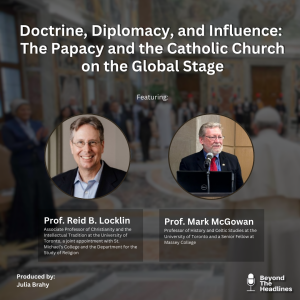
Monday May 05, 2025
Monday May 05, 2025
As the Catholic Church enters a period of profound transition following the death of Pope Francis, questions are mounting over how it will navigate its dual role as a guardian of spiritual tradition and a global political and moral actor. Francis’s tenure as pontiff was defined by a renewed emphasis on social justice, migration, and interreligious dialogue, as well as symbolic gestures that reflected his commitment to marginalized communities and to addressing the moral complexities of an evolving world.
Yet, enduring tensions remain. From reproductive rights to LGBTQ+ inclusion, the boundaries of doctrine continue to shape the Church’s engagement with contemporary social issues. At the same time, the Vatican’s diplomatic footprint has come under renewed scrutiny. From its responses to humanitarian crises in Gaza and Ukraine to its delicate relationships with political leaders around the world, the Church’s moral authority continues to be tested on the global stage.
In this episode, Beyond the Headlines examines the evolving role of the Catholic Church at the intersection of faith, diplomacy, and global politics. As the conclave prepares to elect a new pope, we ask: How will the next chapter of the papacy shape the Church’s stance on key social and political issues? Can it continue to act as a moral compass in an increasingly secular and polarized world? These questions, and more, are explored in conversation with this week’s distinguished guests.
Professor Reid B. Locklin is an Associate Professor of Christianity and the Intellectual Tradition at the University of Toronto, jointly appointed at St. Michael’s College and the Department for the Study of Religion. Professor Locklin is engaged in advancing interfaith understanding and reconciliation. He founded the Truth and Reconciliation Reading Circle at St. Michael’s College and has collaborated with organizations including the Canadian Conference of Catholic Bishops and the Lonergan Research Institute. A long-serving faculty member since 2004, he continues to foster dialogue across cultural and religious divides.
Professor Mark G. McGowan is a Professor of History and Celtic Studies at the University of Toronto and a Senior Fellow at Massey College. A renowned historian of Canadian, Irish, and Catholic history, he has authored award-winning works on immigration, religion, and public life. Professor McGowan has held senior leadership roles at the University of Toronto and St. Michael’s College, and in 2024, he was elected to the Royal Society of Canada in recognition of his contributions to historical scholarship. His current research explores Indigenous contributions to Irish famine relief and the legacies of colonial governance in Canada.
Produced by: Julia Brahy
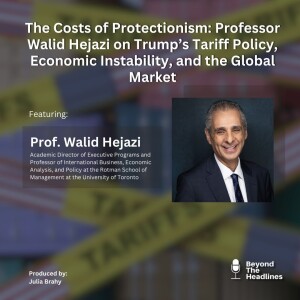
Monday Apr 28, 2025
Monday Apr 28, 2025
In his return to office, President Donald Trump has intensified the use of tariffs as a central instrument of U.S. trade policy. Recent measures have expanded tariffs on strategic imports, particularly from China, and continued the application of steel and aluminum tariffs under Section 232 of the Trade Expansion Act, as well as broader sanctions under Section 301 investigations into intellectual property practices. These policies have been positioned as efforts to protect national industries, reduce trade deficits, and bolster American economic sovereignty, while also signaling a more assertive U.S. approach to global commerce.
Despite these intentions, the structure and execution of these tariff measures have introduced volatility into global markets. Empirical analyses indicate that while select domestic sectors have experienced short-term benefits, overall economic costs—including higher input prices, retaliatory tariffs from trading partners, and dampened investment—have offset many of the perceived gains. International institutions such as the IMF and WTO have linked prolonged tariff conflicts to downward revisions in global growth projections. Financial markets, in turn, have exhibited heightened sensitivity to tariff escalations, reflecting broader uncertainty about the sustainability of current trade policies.
This episode examines the evolving nature of American trade strategy: What distinguishes short-term political signaling from durable economic policymaking? How have Trump’s tariffs reshaped global supply chains, investor confidence, and the strategic positioning of U.S. industries? And as financial markets demand greater predictability and resilience, what future pathways could be pursued to align tariff and fiscal policy with long-term competitiveness and global stability?
Our special guest this week is Professor Walid Hejazi. Professor Hejazi is the Academic Director of Executive Programs and Professor of International Business, Economic Analysis, and Policy at the Rotman School of Management at the University of Toronto. He is also a Fellow at the Michael Lee-Chin Family Institute for Corporate Citizenship and serves on the Board of Directors of the David & Sharon Johnston Centre for Corporate Governance Innovation.
Over the course of his career, Professor Hejazi has advised private-sector firms and collaborated extensively with Canadian and international governments on foreign investment and international trade strategy. He has testified before parliamentary and senate committees, taught extensively in Rotman's MBA, EMBA, and executive education programs, and delivered lectures in over 30 countries worldwide. His research focuses on the intersection of global competitiveness, trade dynamics, and strategic economic policy, making his insights particularly timely for today’s conversation.
Join us as we delve into the consequences of tariff-driven protectionism, the gaps in America's current trade approach, and what more sustainable, market-stabilizing policies could look like in the years ahead.
Produced by: Julia Brahy
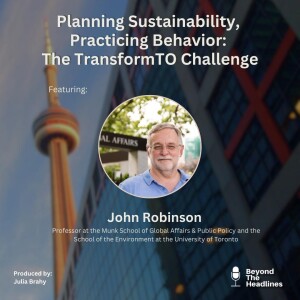
Monday Apr 21, 2025
Monday Apr 21, 2025
In 2017, Toronto launched TransformTO, a comprehensive climate action strategy aiming to reduce greenhouse gas emissions and enhance the city's resilience, health, economy, and social equity. The strategy set ambitious targets, including achieving net-zero emissions by 2040, with interim goals of a 65% reduction by 2030 and 45% by 2025, relative to 1990 levels. TransformTO encompasses key sectors such as buildings, transportation, energy, and waste, and emphasizes co-benefits like improved public health and economic growth.
Despite these commitments, Toronto is not on track to meet its 2030 emissions reduction target. Analyses indicate that without transformative action across all sectors, the city is unlikely to achieve its 2030 and 2040 goals. A significant challenge lies in the strategy's limited integration of behavioral science insights and community engagement mechanisms necessary for lasting change. While TransformTO outlines technical solutions, it lacks robust frameworks to influence and sustain behavioral shifts among residents, particularly in diverse and equity-seeking communities.
This episode examines the behavioral dimensions of urban climate policy: To what extent is TransformTO designed not only to build sustainable infrastructure but also to influence how people live, think, and act in the face of climate change? Can net-zero targets be achieved without addressing the habits, values, and psychological barriers that shape public behavior? We explore how municipal climate planning can evolve to place human behavior, not just emissions metrics or technical interventions, at the center of its mission.
Our special guest this week is Professor John Robinson. Professor Robinson teaches both at the Munk School of Global Affairs & Public Policy and the School of the Environment at the University of Toronto. He currently serves as the Presidential Advisor on the Environment, Climate Change, and Sustainability and is Co-Chair of the President’s Advisory Committee on these issues. His work sits at the intersection of research, public policy, and institutional leadership, with a focus on integrating sustainability across academic and operational domains.
Before joining the University of Toronto, Professor Robinson held several leadership roles at the University of British Columbia, where he founded the Centre for Interactive Research on Sustainability (CIRS), one of North America’s most advanced living laboratories for sustainable building and urban systems. He also played a key role in the development of MetroQuest, a participatory urban planning tool used by cities across North America. He has worked extensively with graduate students, academics, municipal leaders, and community groups, championing research that is inclusive, applied, and grounded in real-world change.
Tune in as we examine why TransformTO is a resourceful program for implementing sustainability strategies across Toronto, and what gaps currently exist within its mechanisms.
Produced by: Julia Brahy
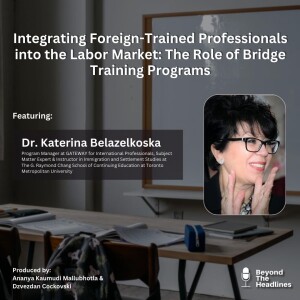
Monday Apr 14, 2025
Monday Apr 14, 2025
Professional accreditation continues to be a major barrier for internationally trained professionals in Canada. Despite arriving with extensive qualifications and experience, many immigrants face difficulties re-entering their fields due to licensing hurdles, regulatory misalignment, and limited institutional support. Ontario’s Bridge Training Programs aim to address this gap by offering tailored pathways to help skilled newcomers integrate into the workforce.
In this episode of Beyond the Headlines, we examine how these programs operate, where they succeed, and what challenges remain. From funding and regulatory constraints to employer engagement and federal-provincial coordination, we explore the policy and structural factors shaping their impact. We also compare Ontario’s approach to similar initiatives elsewhere, asking what reforms are needed to expand access and improve outcomes for newcomers across Canada’s evolving labor market.
Our guest this week is Dr. Katerina Belazelkoska, Program Manager at GATEWAY for International Professionals. Dr. Belazelkoska is an expert and instructor in Immigration and Settlement Studies at the G. Raymond Chang School of Continuing Education at Toronto Metropolitan University. With a PhD in Educational Administration and more than a decade of leadership experience in the settlement and education sectors, Dr. Belazelkoska brings both academic depth and on-the-ground insight to the conversation.
Join us as we explore the structural, policy, and economic dimensions of immigrant workforce integration - and how reimagining credential recognition can advance both inclusion and innovation in Canada’s labor market.
Produced by: Ananya Kaumudi Mallubhotla & Dzvezdan Cockovski
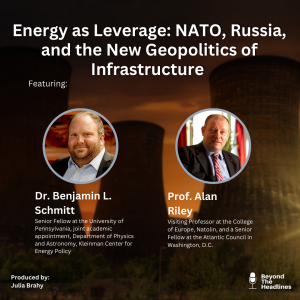
Monday Apr 07, 2025
Monday Apr 07, 2025
As Russia’s full-scale invasion of Ukraine continues to reshape the global order, energy security has emerged as a defining challenge for NATO and its allies. From pipeline politics to infrastructure sabotage and disinformation campaigns, the Kremlin has long used energy as a geopolitical weapon to exert influence and destabilize democracies. In response, NATO members and EU states have launched ambitious efforts to decouple from Russian fossil fuels, bolster infrastructure resilience, and reconfigure energy supply chains.
Yet key questions persist: Is Europe’s shift away from Russian energy a structural transformation or a temporary pivot? How is the transatlantic alliance adapting to protect critical infrastructure from cyberattacks, sabotage, and narrative manipulation? And as the green transition accelerates, will energy decarbonization open new fault lines—or create lasting strategic resilience?
In this episode, Beyond the Headlines examines the evolving nexus of energy, security, and democratic resilience. We speak with two leading experts in transatlantic policy and law to explore how NATO and its partners are responding to a rapidly shifting energy landscape—and how Russia’s use of energy as leverage is transforming global politics.
Dr. Benjamin L. Schmitt is a Senior Fellow at the University of Pennsylvania, where he holds joint appointments with the Department of Physics and Astronomy, the Kleinman Center for Energy Policy, and Perry World House. His work bridges advanced research in experimental cosmology with international policy engagement on energy security, infrastructure resilience, and sanctions regimes. A former European Energy Security Advisor at the U.S. Department of State, Dr. Schmitt led diplomatic efforts to support NATO’s eastern flank and counter Russian malign energy activities. He is also a Senior Fellow for Democratic Resilience at the Center for European Policy Analysis (CEPA), an Associate of the Harvard Ukrainian Research Institute, and a Term Member of the Council on Foreign Relations.
Professor Alan Riley is a Visiting Professor at the College of Europe, Natolin, and a Senior Fellow at the Atlantic Council. A legal expert in European competition, trade, and energy law, he has advised governments, EU institutions, and companies on strategy and regulation surrounding energy infrastructure and security. He currently serves as an energy advisor to the Prime Minister of Moldova and sits on the Advisory Committee of the Energy Community in Vienna, applying EU energy law across Ukraine, Moldova, Georgia, and the Western Balkans. Professor Riley has written extensively on Nord Stream 2, foreign direct investment policy, and EU antitrust frameworks.
Produced by: Julia Brahy
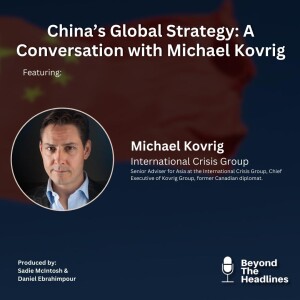
Monday Mar 31, 2025
Monday Mar 31, 2025
Last week, reports surfaced that four Canadian nationals were executed in the People’s Republic of China earlier this year on drug-related charges. This deeply troubling development represents a new and grave chapter in the ongoing deterioration of Sino-Canadian relations. Beyond the human tragedy, these executions raise urgent questions regarding the state of diplomacy, the role of international legal norms, and the broader strategic posture of China on the global stage.
At a time when geopolitical tensions are escalating - marked by intensifying U.S.–China rivalry, global economic fragmentation, and growing scrutiny of China’s human rights record - Canada finds itself navigating a precarious diplomatic landscape. The challenge is not merely bilateral, but emblematic of the broader struggles that middle powers face in balancing national interests, moral imperatives, and strategic alliances.
As China’s global strategy continues to evolve, it is critical that Canadians and the international community alike deepen their understanding of its geopolitical ambitions, regional influence, and approach to international engagement.
This week on Beyond the Headlines, we are honoured to welcome Michael Kovrig, Senior Adviser for Asia at the International Crisis Group and Chief Executive Officer of the Kovrig Group, a geopolitical risk consultancy. Mr. Kovrig is a distinguished expert in international affairs whose research and advisory work focuses on geopolitics, geoeconomics, global security, and human rights, with a particular emphasis on China, the Indo-Pacific region, and related Western foreign policy.
He previously served for over a decade as a Canadian diplomat, with postings in Ottawa, at the United Nations, and in Beijing. His professional background also includes roles in strategic communications at the United Nations Development Group, as well as journalism and economic research with a focus on China and Central and Eastern Europe. Mr. Kovrig holds a master’s degree in international affairs from Columbia University and is fluent in both French and Mandarin Chinese.
From 2014 to 2021, he resided in China, where he was arbitrarily detained by the Ministry of State Security for nearly three years. Widely regarded as a case of politically motivated hostage diplomacy, his detention drew international condemnation. Drawing on both his personal experience and professional expertise, Mr. Kovrig offers a unique and authoritative perspective on the shifting contours of China’s foreign policy, the evolving nature of Canada–China relations, and the role of diplomacy in an increasingly polarized international landscape.
Produced by: Sadie McIntosh & Daniel Ebrahimpour
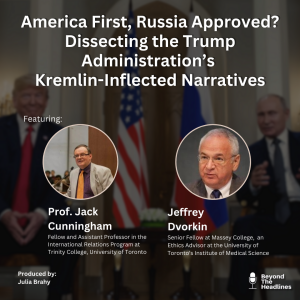
Monday Mar 24, 2025
Monday Mar 24, 2025
Since returning to office, President Donald Trump has led a significant realignment of U.S. foreign policy - one that increasingly reflects Kremlin-supported narratives surrounding the war in Ukraine, NATO, and the global liberal order. From proposing ceasefire terms that favor Russian strategic interests to downplaying Ukraine’s sovereignty, the administration’s rhetoric has raised questions about the erosion of traditional U.S. security commitments and a broader shift away from transatlantic norms.
Simultaneously, disinformation campaigns and foreign influence operations—especially those originating from Russia - have intensified, shaping domestic political discourse and shifting public opinion among segments of the American electorate. A growing number of Americans, particularly within Trump’s political base, now express sympathetic views toward Russia, revealing the power of media fragmentation and narrative manipulation.
In this episode of Beyond the Headlines, we explore the intersections of policy, politics, and media in a moment of global uncertainty. What does the Trump administration’s alignment with Kremlin interests mean for the U.S.-Russia-Ukraine dynamic? What role does the media play in reinforcing or resisting foreign narratives? And how might this shifting landscape impact democratic institutions and global security?
We’re joined by two experts who offer insight into these complex questions.
Dr. Jack Cunningham is a Fellow and Assistant Professor in the International Relations Program at Trinity College, University of Toronto, and serves as Program Coordinator at the Bill Graham Centre for Contemporary International History. His research focuses on modern conflict and Canadian foreign policy, with publications on nuclear diplomacy, the war in Afghanistan, and the 2003 invasion of Iraq. He is a former editor of International Journal, Canada’s leading journal of international affairs.
Jeffrey Dvorkin is a journalist, media ethicist, and Senior Fellow at Massey College, University of Toronto. He previously served as NPR’s first news ombudsman and Vice President of News and Information, as well as Managing Editor and Chief Journalist for CBC Radio. From 2010 to 2019, he directed the Journalism Program at the University of Toronto Scarborough. He is the author of Trusting the News in a Digital Age (Wiley, 2021), a critical examination of trust and transparency in modern journalism.
Produced by: Julia Brahy

Monday Mar 17, 2025
Monday Mar 17, 2025
The prevailing discourse on sustainability is often dominated by high-tech solutions—AI-driven emissions tracking, smart grids, and digital monitoring systems. While these technologies play an important role in measuring and managing environmental impact, they do not address the structural and systemic changes necessary to build a truly sustainable future. The built environment—infrastructure, material use, and urban design—fundamentally shapes environmental outcomes, yet discussions on sustainability frequently overlook low-tech, high-impact solutions in favor of complex monitoring mechanisms.
That being said, the increasing reliance on data-driven climate strategies raises concerns about privacy, governance, and the broader role of digital surveillance in environmental policy. Individuals already provide more personal data to private corporations via smartphones than they do to public sustainability initiatives, yet cities continue to struggle with translating environmental data into meaningful action. This raises an essential question: should we focus less on tracking sustainability and more on embedding it into infrastructure, construction, and urban planning from the outset?
This week on Beyond the Headlines, we examine the intersection of sustainability, infrastructure, and governance. How can we integrate low-tech, scalable solutions into urban design and construction to reduce environmental impact without reliance on constant monitoring? What role do transportation networks, material efficiency, and land-use planning play in driving sustainability outcomes? And how can policymakers balance data collection, climate accountability, and privacy considerations in environmental governance?
To explore these critical questions, we are joined by Dr. Shoshanna Saxe, a leading expert in sustainable infrastructure and urban resilience. She is an Assistant Professor in the University of Toronto’s Department of Civil and Mineral Engineering and holds the Canada Research Chair in Sustainable Infrastructure. Dr. Saxe’s research investigates the relationship between infrastructure and society, identifying pathways to align urban development, transportation systems, and material use with long-term sustainability goals.
Beyond academia, Dr. Saxe is actively involved in policy and sustainability governance, serving on Waterfront Toronto’s Capital Peer Review Panel and the board of the International Society for Industrial Ecology. Recognized as one of Canada’s emerging environmental leaders by Clean50, she was also awarded the 2019 Ontario Engineering Medal – Young Engineer. Her research and expert commentary have been widely featured in The New York Times, The BBC, The Toronto Star, The Financial Post, Spacing Magazine, and Wired.
Join us as we move beyond the traditional conversation on high-tech climate solutions and critically examine the foundational role of infrastructure, design, and governance in shaping a sustainable future.
Produced by: Julia Brahy
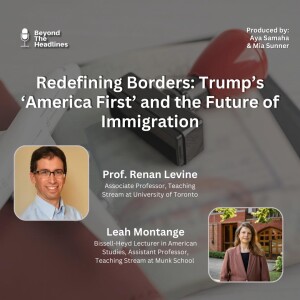
Monday Mar 10, 2025
Monday Mar 10, 2025
Since the 2016 election, Donald Trump’s “America First” doctrine has reshaped U.S. immigration policy and the global conversation around borders, sovereignty, and national security. His administration implemented sweeping immigration restrictions, from the travel ban targeting Muslim-majority countries to family separation policies and enhanced border enforcement. These measures reflected a broader shift toward nationalism, protectionism, and a rejection of multilateral immigration agreements.
Under his second administration, the legacy of Trump's immigration policies continues to shape debates on migration, security, and human rights. How have these policies altered U.S. relationships with neighboring countries? What have been the economic and social consequences of tightening immigration restrictions? And what does the future of U.S. immigration look like in a global landscape increasingly defined by border fortification and rising nationalism?
In this episode of Beyond the Headlines, we take a closer look at the long-term implications of Trump’s immigration policies and their impact on migrants, U.S. foreign relations, and international migration patterns.
Our first guest is Professor Renan Levine, an Associate Professor in the Teaching Stream at the University of Toronto. He holds a PhD from Duke University and specializes in American politics, electoral behavior, and public opinion. His research examines the role of political institutions and ideology in shaping policy decisions, including those related to immigration. Today, we’ll be discussing the political motivations behind Trump’s “America First” immigration policies, their impact on voter sentiment, and the broader implications for the 2024 election.
Joining us next is Professor Leah Montange, a human geographer and expert in migration, borders, and resistance. She is the Bissell-Heyd Lecturer in American Studies at the University of Toronto and has published extensively on immigration enforcement, border detention, and migrant rights. Her work explores how migration policies shape lived experiences and resistance movements. In today’s discussion, she’ll provide insight into how Trump’s border policies have affected migrant communities, asylum seekers, and the broader discourse around immigration enforcement.
Produced by: Mia Sunner & Aya Samaha
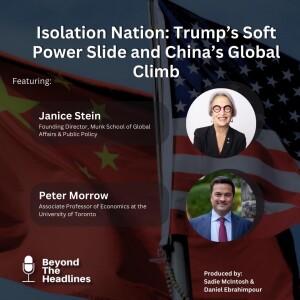
Monday Mar 03, 2025
Monday Mar 03, 2025
Since his January 20th inauguration, President Donald Trump has advanced an increasingly isolationist approach to international relations. From imposing 25% tariffs on Canada to claiming Ukraine instigated the ongoing conflict with Russia and proposing the displacement of Palestinians as a solution to the war in Gaza, his administration has fundamentally shifted U.S. foreign policy. Once the cornerstone of American global influence, soft power is eroding under the Trump presidency. What does this mean for the future of international diplomacy and trade? How will China position itself as America’s greatest competitor? And where does Canada fit into this shifting landscape?
In today’s episode of Beyond the Headlines, we dive into the implications of declining American soft power and its impact on the global order. To unpack these questions, we are joined by two distinguished experts in international relations and economics.
Janice Gross Stein is the Belzberg Professor of Conflict Management and the founding Director of the Munk School of Global Affairs at the University of Toronto. A leading authority on world politics, she is a Fellow of the Royal Society of Canada and a member of both the Order of Canada and the Order of Ontario. She was the 2001 Massey Lecturer and an inaugural Trudeau Fellow, receiving the Molson Prize from the Canada Council for outstanding contributions to public debate. With an academic career spanning decades, she has authored eight books and over a hundred articles, with her latest research exploring the intersection of geopolitics and technology.
Dr. Peter Morrow is an Associate Professor of Economics at the University of Toronto, specializing in international trade and applied microeconomics. His research focuses on U.S.-Canada trade relations, Chinese trade policy, and the broader economic impacts of globalization. He has served as a Senior Researcher for the Federal Reserve Bank of Boston and as a co-editor for the Canadian Journal of Economics. His work has been widely recognized, with support from Statistics Canada and the Social Sciences and Humanities Research Council.
Join us as we analyze the evolving global order and what the future holds for trade, diplomacy, and Canada’s role in a changing world.
Produced by: Sadie McIntosh & Daniel Ebrahimpour








